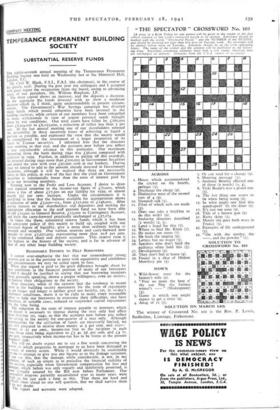COMPANY MEETING
TEMPERANCE PERMANENT BUILDING SOCIETY
SUBSTANTIAL RESERVE FUNDS
The eighty-seventh annual meeting of the Temperance Permanent Building Society was held on Wednesday last at the Memorial Hall, London, E.C. Mr. Cyril W. Black? F.S.I., F.A.I. (the chairman), in the course of his speech, said: During the past year my colleagues and I accepted with great regret the resignation from the board, owing to advancing years, of our president, Mr. William Bingham, J.P.
The share capital shows an increase, and the deposits a decrease. In the aggregate the funds invested with us show a moderate decrease which is, I think, quite understandable in present circum- stances. The Government's War Savings campaign has diverted many funds which would otherwise have been invested in the building societies, while certain of our members have been compelled to make withdrawals in view of urgent personal needs brought about by war conditions. Our total assets have fallen by £181,000 from £6,304,000 to £6,123,000, a reduction of rather less than 3 per cent. At the last annual meeting one of our shareholders stressed the desirability in these uncertain times of achieving as liquid a position as possible, and expressed the view that the society would be strengthened by the investment of a larger proportion of its funds in Trustee securities. I informed him that the directors were working to that end, and the accounts now before you reflect a very considerable advance in this particular. Our maximum borrowing from the bank during 1940 was £56,000 compared with C218,000 in t939. Further, in addition to paying off this overdraft, we invested during 1940 more than £100,000 in Government Securities and ended the year with over £97,000 cash at our bankers. During 1941 we intend to add to the amount already invested in Government Securities, although it will be realised that there are necessarily limits to this policy, in view of the fact that the yield on Government securities is substantially lower than the rates of interest paid by us to our investing members. Turning now to the Profit and Loss Account, I desire to draw your especial attention to the income-tax figure of £70,000, which shows a rise of about £17,500 on our liability for 1939, or almost exactly 33-1 per cent. increase. Under the circumstances it is gratifying to note that the balance available for appropriation shows a reduction of only £5,000-i.e., from £15I,000 to £146,000. After paying interest to our shareholders and depositors and making the appropriate allocation to the staff pension fund we have been able to add £io,000 to General Reserve, £15,000 to Contingency Account, and leave the carry-forward practically unchanged at £27,174. In times like these, substantial reserve funds, which it has been the consistent policy of this society to build up, coupled with our increased degree of liquidity, give a more than ordinary feeling of strength and security. Our various reserves and carry-forward now amount to over £1,057,000, representing more than 20.8 per cent. of the combined share and deposit accounts. This reserve ratio is the highest in the history of the society, and is far in advance of that of any other large building society.
REASONABLE EFFORTS TO HELP BORROWERS
I cannot over-emphasise the fact that our tremendously strong reserves put us in the position to meet with equanimity and confidence any circumstances we may be called upon to face. When due regard is paid to the great difference brought about by war conditions in the financial position of many of our borrowers I feel I should be justified in saying that our borrowing members have, generally speaking, shown a proper willingness, even an anxiety, to honour their obligations to the society.
Your directors while of the opinion that the tendency in recent years in the building society movement for the term of repayment to get longer and longer is neither good nor healthy, yet, in to-day's abnormal conditions, deem it to be right to make every reasonable effort to help our borrowers to overcome their difficulties, and have therefore, in suitable cases, reduced or suspended capital repayments time for the me being.
The reduction in the rates of interest payable to investors which we found it necessary to impose during the year only had effect from October 1st, 1940, so that the accounts now before you reflect saving to the society for one-quarter of a year only. Although Poortunities for the utilisation of funds are necessarily limited, we are still prepared to receive share money at 3 per cent. and depos- money at 2} per cent., income-tax free to the recipient in each case, those rates being equivalent to £5 4s. 3d. per cent. and £4 7s. Per cent. respectively when income-tax has to be borne at the present standard rate.
You will no doubt expect me to say a few words concerning the enr to which properties in mortgage to us have been damaged as result of enemy action. While it would obviously be undesirable fee me to attempt to give you any figures as to the damage sustained, can say this, that the damage, while considerable, is not, in nay inion, of such an extent as to prejudice the financial stability of he society, especially when Government compensation for loss and _ inage, which before was only vaguely and indefinitely promised, is u_Ow virtually assured by the Bill now before Parliament. Our unrivalled reserves patiently accumulated over so many years were
fit up for just such a time as .this. an
his. That there are hard and
fil
cult times ahead no one will question, that we shall survive them do not doubt. The report and accounts were adopted.


























 Previous page
Previous page